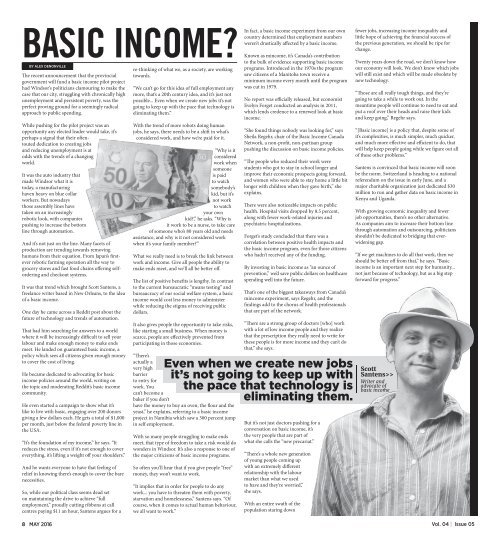Windsor Independent - May 2016
Windsor and Essex County's community publication. Shining a light on local art, music, politics and eats. In this issue: F&B Walkerville, Chris Pontius of Jackass, Universal Basic Income, Summer Festival Guide, Ask Spenny, O'Vinshaw's, and more...
Windsor and Essex County's community publication. Shining a light on local art, music, politics and eats. In this issue: F&B Walkerville, Chris Pontius of Jackass, Universal Basic Income, Summer Festival Guide, Ask Spenny, O'Vinshaw's, and more...
Create successful ePaper yourself
Turn your PDF publications into a flip-book with our unique Google optimized e-Paper software.
BASIC INCOME?<br />
BY ALEX DENONVILLE<br />
The recent announcement that the provincial<br />
government will fund a basic income pilot project<br />
had <strong>Windsor</strong>’s politicians clamouring to make the<br />
case that our city, struggling with chronically high<br />
unemployment and persistent poverty, was the<br />
perfect proving ground for a seemingly radical<br />
approach to public spending.<br />
While pushing for the pilot project was an<br />
opportunity any elected leader would take, it’s<br />
perhaps a signal that their oftentouted<br />
dedication to creating jobs<br />
and reducing unemployment is at<br />
odds with the trends of a changing<br />
world.<br />
It was the auto industry that<br />
made <strong>Windsor</strong> what it is<br />
today, a manufacturing<br />
haven heavy on blue collar<br />
workers. But nowadays<br />
those assembly lines have<br />
taken on an increasingly<br />
robotic look, with companies<br />
pushing to increase the bottom<br />
line through automation.<br />
And it’s not just on the line. Many facets of<br />
production are trending towards removing<br />
humans from their equation. From Japan’s firstever<br />
robotic farming operation all the way to<br />
grocery stores and fast food chains offering selfordering<br />
and checkout systems.<br />
It was that trend which brought Scott Santens, a<br />
freelance writer based in New Orleans, to the idea<br />
of a basic income.<br />
One day he came across a Reddit post about the<br />
future of technology and trends of automation.<br />
That had him searching for answers to a world<br />
where it will be increasingly difficult to sell your<br />
labour and make enough money to make ends<br />
meet. He landed on guaranteed basic income, a<br />
policy which sees all citizens given enough money<br />
to cover the cost of living.<br />
He became dedicated to advocating for basic<br />
income policies around the world, writing on<br />
the topic and moderating Reddit’s basic income<br />
community.<br />
He even started a campaign to show what it’s<br />
like to live with basic, engaging over 200 donors<br />
giving a few dollars each. He gets a total of $1,000<br />
per month, just below the federal poverty line in<br />
the USA.<br />
“It’s the foundation of my income,” he says. “It<br />
reduces the stress, even if it’s not enough to cover<br />
everything, it’s lifting a weight off your shoulders.”<br />
And he wants everyone to have that feeling of<br />
relief in knowing there’s enough to cover the bare<br />
necessities.<br />
So, while our political class seems dead set<br />
on maintaining the drive to achieve “full<br />
employment,” proudly cutting ribbons at call<br />
centres paying $11 an hour, Santens argues for a<br />
re-thinking of what we, as a society, are working<br />
towards.<br />
“We can’t go for this idea of full employment any<br />
more, that’s a 20th century idea, and it’s just not<br />
possible... Even when we create new jobs it’s not<br />
going to keep up with the pace that technology is<br />
eliminating them.”<br />
With the trend of more robots doing human<br />
jobs, he says, there needs to be a shift in what’s<br />
considered work, and how we’re paid for it.<br />
“Why is it<br />
considered<br />
work when<br />
someone<br />
is paid<br />
to watch<br />
somebody’s<br />
kid, but it’s<br />
not work<br />
to watch<br />
your own<br />
kid?,” he asks. “Why is<br />
it work to be a nurse, to take care<br />
of someone who’s 80 years old and needs<br />
assistance, and why is it not considered work<br />
when it’s your family member?”<br />
What we really need is to break the link between<br />
work and income. Give all people the ability to<br />
make ends meet, and we’ll all be better off.<br />
The list of positive benefits is lengthy. In contrast<br />
to the current bureaucratic “means testing” and<br />
bureaucracy of our social welfare system, a basic<br />
income would cost less money to administer<br />
while reducing the stigma of receiving public<br />
dollars.<br />
It also gives people the opportunity to take risks,<br />
like starting a small business. When money is<br />
scarce, people are effectively prevented from<br />
participating in those economies.<br />
“There’s<br />
actually a<br />
very high<br />
barrier<br />
to entry for<br />
work. You<br />
can’t become a<br />
baker if you don’t<br />
have the money to buy an oven, the flour and the<br />
yeast,” he explains, referring to a basic income<br />
project in Namibia which saw a 300 percent jump<br />
in self employment.<br />
With so many people struggling to make ends<br />
meet, that type of freedom to take a risk would do<br />
wonders in <strong>Windsor</strong>. It’s also a response to one of<br />
the major criticisms of basic income programs.<br />
So often you’ll hear that if you give people “free”<br />
money, they won’t want to work.<br />
“It implies that in order for people to do any<br />
work... you have to threaten them with poverty,<br />
starvation and homelessness,” Santens says. “Of<br />
course, when it comes to actual human behaviour,<br />
we all want to work.”<br />
In fact, a basic income experiment from our own<br />
country determined that employment numbers<br />
weren’t drastically affected by a basic income.<br />
Known as mincome, it’s Canada’s contribution<br />
to the bulk of evidence supporting basic income<br />
programs. Introduced in the 1970s the program<br />
saw citizens of a Manitoba town receive a<br />
minimum income every month until the program<br />
was cut in 1979.<br />
No report was officially released, but economist<br />
Evelyn Forget conducted an analysis in 2011,<br />
which lends credence to a renewed look at basic<br />
income.<br />
“She found things nobody was looking for,” says<br />
Sheila Regehr, chair of the Basic Income Canada<br />
Network, a non-profit, non-partisan group<br />
pushing the discussion on basic income policies.<br />
“The people who reduced their work were<br />
students who got to stay in school longer and<br />
improve their economic prospects going forward,<br />
and women who were able to stay home a little bit<br />
longer with children when they gave birth,” she<br />
explains.<br />
There were also noticeable impacts on public<br />
health. Hospital visits dropped by 8.5 percent,<br />
along with fewer work-related injuries and<br />
psychiatric hospitalizations.<br />
Forget’s study concluded that there was a<br />
correlation between positive health impacts and<br />
the basic income program, even for those citizens<br />
who hadn’t received any of the funding.<br />
By investing in basic income as “an ounce of<br />
prevention,” we’d save public dollars on healthcare<br />
spending well into the future.<br />
That’s one of the biggest takeaways from Canada’s<br />
mincome experiment, says Regehr, and the<br />
findings add to the chorus of health professionals<br />
that are part of the network.<br />
“There are a strong group of doctors [who] work<br />
with a lot of low income people and they realize<br />
that the prescription they really need to write for<br />
these people is for more income and they can’t do<br />
that,” she says.<br />
Even when we create new jobs<br />
it’s not going to keep up with<br />
the pace that technology is<br />
eliminating them.<br />
But it’s not just doctors pushing for a<br />
conversation on basic income, it’s<br />
the very people that are part of<br />
what she calls the “new precariat.”<br />
“There’s a whole new generation<br />
of young people coming up<br />
with an extremely different<br />
relationship with the labour<br />
market than what we used<br />
to have and they’re worried,”<br />
she says.<br />
With an entire swath of the<br />
population staring down<br />
fewer jobs, increasing income inequality and<br />
little hope of achieving the financial success of<br />
the previous generation, we should be ripe for<br />
change.<br />
Twenty years down the road, we don’t know how<br />
our economy will look. We don’t know which jobs<br />
will still exist and which will be made obsolete by<br />
new technology.<br />
“Those are all really tough things, and they’re<br />
going to take a while to work out. In the<br />
meantime people will continue to need to eat and<br />
put a roof over their heads and raise their kids<br />
and keep going,” Regehr says.<br />
“[Basic income] is a policy that, despite some of<br />
it’s complexities, is much simpler, much quicker,<br />
and much more effective and efficient to do, that<br />
will help keep people going while we figure out all<br />
of these other problems.”<br />
Santens is convinced that basic income will soon<br />
be the norm. Switzerland is heading to a national<br />
referendum on the issue in early June, and a<br />
major charitable organization just dedicated $30<br />
million to run and gather data on basic income in<br />
Kenya and Uganda.<br />
With growing economic inequality and fewer<br />
job opportunities, there’s no other alternative.<br />
As companies aim to increase their bottom line<br />
through automation and outsourcing, politicians<br />
shouldn’t be dedicated to bridging that everwidening<br />
gap.<br />
“If we get machines to do all that work, then we<br />
should be better off from that,” he says. “Basic<br />
income is an important next step for humanity...<br />
not just because of technology, but as a big step<br />
forward for progress.”<br />
Scott<br />
Santens>><br />
Writer and<br />
advocate of<br />
basic income<br />
8<br />
MAY <strong>2016</strong> Vol. 04 | Issue 05








